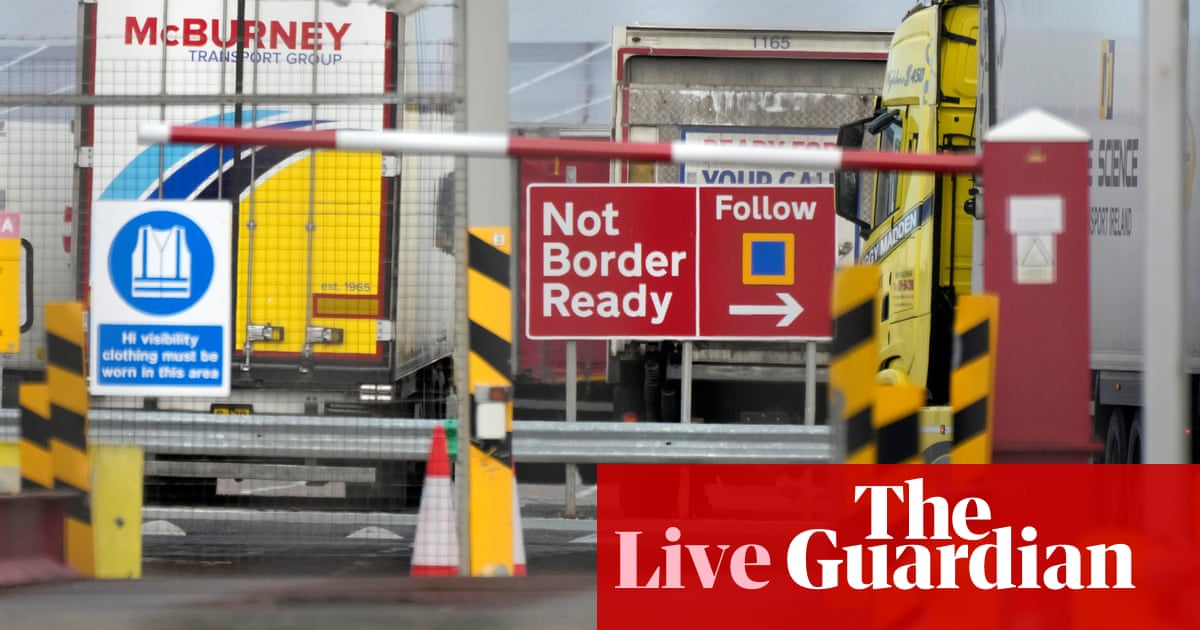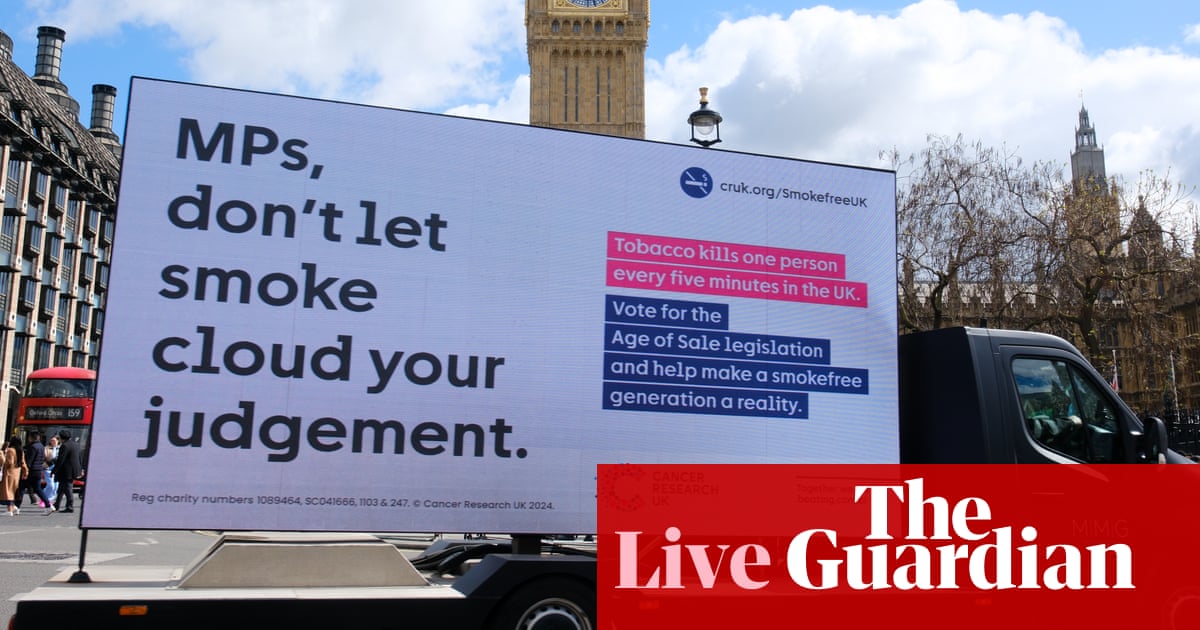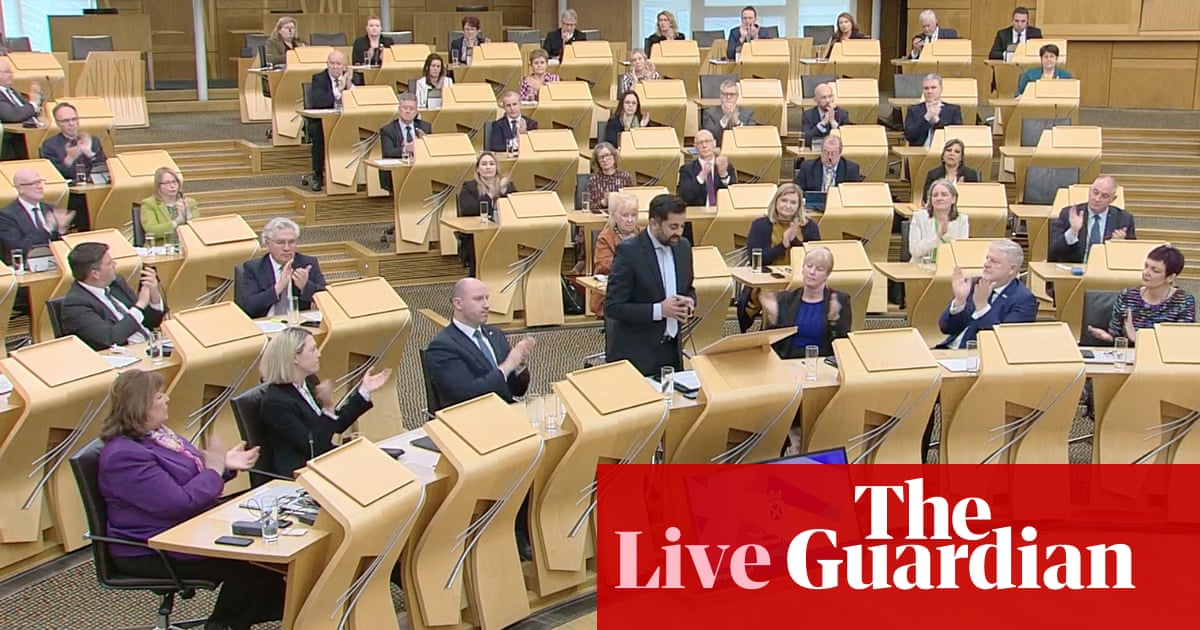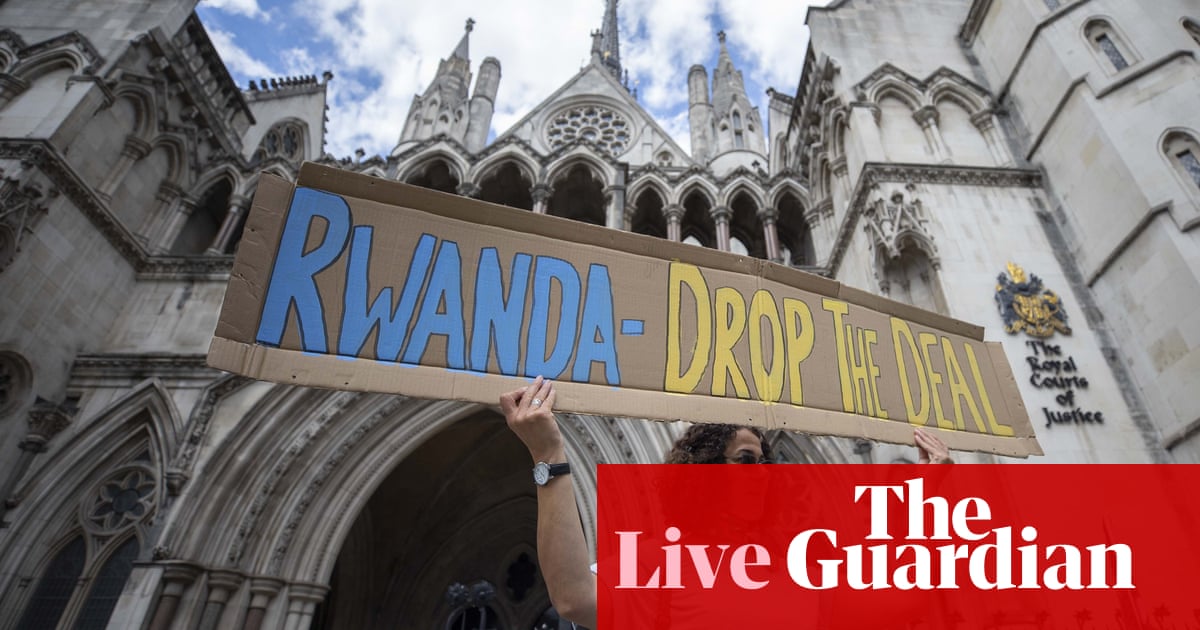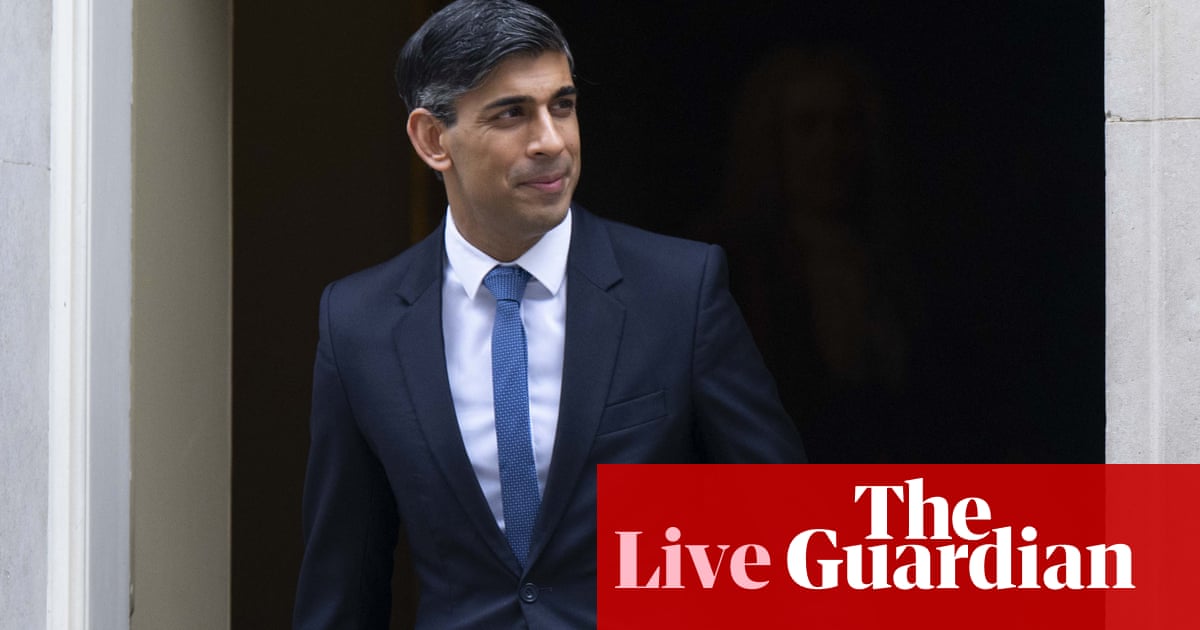
Government wins vote on the second reading of the Northern Ireland protocol bill
The government has won the vote on the second reading of the Northern Ireland Protocol bill by 295 votes to 221.
A summary of today"s developments
The government has won the vote on the second reading of the Northern Ireland protocol bill by 295 votes to 221. The vote result means Boris Johnson’s bid to effectively tear up parts of the Northern Ireland protocol has cleared its first Commons hurdle, amid Tory warnings the plans are illegal. Former prime minister Theresa May said she could not support the Bill, saying it will “diminish” the UK in the eyes of the world.
The majority of 74 gives the Northern Ireland protocol bill a second reading which clears the way for it to undergo detailed scrutiny in the coming weeks.
Earlier, Boris Johnson claimed the legislation - that will allow the UK government to abandon large parts of the protocol, in what critics argued is a clear breach of international law - could become law by the end of the year. Asked if the measures could be in place this year, he replied: “Yes, I think we could do it very fast, parliament willing.”
Boris Johnson has said that he considers the Conservative party leadership issue now “settled”.
Downing Street rejected a claim from Lord Frost, the former Brexit minister, that the online harms bill makes speech that is legal offline effectively illegal online.
Sajid Javid, the health secretary, has given a Commons statement to mark the publication of the draft mental health bill. He told MPs it would address a number of “alarming issues” with the way the current Mental Health Act is used.
Foreign secretary Liz Truss has warned against an “uneasy peace” in Ukraine that would involve the country giving up any lands it has lost to Russia since 2014.
In an interview with Die Welt, La Repubblica and El Pais, Truss called for the West to provide “all the equipment”, training and “all the support we can” to Kyiv.
“The consequences of Ukraine not prevailing are very severe for the rest of Europe,” she said.
“What we cannot have is some uneasy peace, where Russia is still present in Ukraine; that is not going to work.
“We know what happened in 2014 with the Minsk agreements, ultimately, Russia regrouped and came back for more afterwards, so we cannot allow that situation to happen again”.
The Labour party has pushed for more careers guidance for pupils, saying that “all too often” pupils are unaware of apprenticeship schemes while they are at school.
The party has pledged to fix a “broken system” when it comes to the careers advice pupils receive at school.
In a speech to the Association of Education and Learning Providers, Toby Perkins, Labour’s shadow minister for further education and skills, is expected to say that there is “uncertainty” over legislation in the Skills Bill, and that the Bill itself has been a “missed opportunity”.
He is expected to say that “it remains unclear” how independent training providers will be affected by employer representative bodies and local skills improvement plans.
The aim of the bodies and skills improvement plans is for colleges to make sure their training courses align with local business needs.
The division list showed no Conservative MPs voted against the Northern Ireland Protocol bill at second reading.
It added 283 Tory MPs supported the bill along with eight DUP MPs.
The vote result means Boris Johnson’s bid to effectively tear up parts of the Northern Ireland protocol has cleared its first Commons hurdle, amid Tory warnings the plans are illegal.
MPs voted 295 to 221, majority 74, to give the Northern Ireland Protocol bill a second reading which clears the way for it to undergo detailed scrutiny in the coming weeks.
The prime minister claimed the proposed legislation, which gives ministers powers to override parts of the post-Brexit deal on Northern Ireland, could be carried out “fairly rapidly”, with the proposals in law by the end of the year. But his predecessor in No 10, Theresa May, led the criticism from the Tory benches as she delivered a withering assessment of the legality and impact of the bill. A Number 10 spokesman said the government had never put a “hard target date” on when it would hope to see the bill enacted.
Government wins vote on the second reading of the Northern Ireland protocol bill
The government has won the vote on the second reading of the Northern Ireland Protocol bill by 295 votes to 221.
MPs voting on Northern Ireland protocol bill at second reading
The result is expected in around 15 minutes.
Conservative former Northern Ireland minister Andrew Murrison said he will support the Northern Ireland Protocol Bill, but said he is “somewhat bewildered” by ministers’ refusal to consider triggering Article 16.
The MP for South West Wiltshire, told MPs: “I have to say to ministers also, whilst assuring them of my support this evening, that I remain somewhat bewildered by their refusal to consider, in a meaningful way, triggering Article 16. “That is already available to them and nobody has marshalled credible argument, that satisfies me certainly, that it could not be done, should not be done. The grounds for triggering Article 16 are clearly there, in that we don’t have anything approaching proper covenants in Northern Ireland, not at all. “Despite the May elections, the Assembly has failed to assemble, and the institutions are not working.”
Conservative former minister Sir Bob Neill told the Commons: “I will not support the Bill tonight, I will not vote against it, I’m deliberately abstaining tonight to see how the Bill develops because I think it could be amended into a workable form, but it comes with very many caveats and a lot of questions I think the ministers need to answer.
“I hope they will seek to address those as we go forward.”
Alliance MP Stephen Farry (North Down) said: “This is an extremely bad Bill, it’s unwanted, unnecessary and, indeed, it’s dangerous.”
DUP MP Sammy Wilson criticised Labour’s Stella Creasy, suggesting she was “hoping that the toffs down the other end of this building will defeat this bill”.
The East Antrim MP was also disdainful of Creasy for suggesting that politicians “consult the people of Northern Ireland” on future post-Brexit trade arrangements, adding: “They didn’t consult too much ... when it came to abortion.” Commons deputy Speaker Nigel Evans intervened, asking: “I think the honourable member is talking about the members in the Other Place?” with Mr Wilson confirming that he was. The SNP’s Angus Brendan MacNeil raised a point of order to ask if MPs were now allowed to refer to the Lords as “the House of Toffs”, adding: “I think it is a rather good suggestion.” Evans replied: “I think you’ll find that that was corrected to members of the Other Place, even noble members of the Other Place. Toffs – no.” Walthamstow MP Ms Creasy earlier said she had “hopes for the other place” to deal with the bill.
Conservative former justice secretary Sir Robert Buckland said there is necessity for the government to act because there is a growing and “real threat”.
He said: “A lot has been said about necessity, as if it requires imminent peril, the sort of immediate threat that faces us just outside that door now.
“Now, nobody’s saying that. But necessity in this context doesn’t require that degree of imminence. What it requires is a degree of real threat and a growing evidence of a real threat to those essential interests. I would argue that there is that growing evidence.”
“There is a growing problem when it comes to east-west,” he said, referencing trade-related issues, before going on to urge colleagues to vote for the Bill “in the hope and expectation that we see real progress and the stability that the people of Northern Ireland and the people of Britain want and deserve”.
However, Conservative MP Sir Roger Gale said the Bill “will be a gross breach, if it is enacted and implemented, of international law”.
SDLP MP Claire Hanna called for a “negotiated solution” with the EU as she told MPs “we have solved bigger problems than these before”.
The MP for Belfast South insisted “there’s no doubt that the protocol can be smooth” and “the operation can be improved”, adding: “Everybody says that.
“Nobody, as I’ve said before, in Northern Ireland loves the protocol, but we know that the better options were voted down, but like everything that’s worth doing in Northern Ireland that will be achieved through partnership, through compromises, and not through unmeetable red lines that would remove the people of Northern Ireland from the single market, which is something that has no support.
But instead of doing the hard work and levelling with the people of Northern Ireland, this Government, to whom the DUP have shackled themselves, are choosing to distort and deflect.”
Labour former minister Sir Tony Lloyd warned using legislation “tactically” when it comes to issues related to Northern Ireland is “foolish” and “very dangerous”.
Sir Tony told the Commons: “Anybody in this House who takes legislation seriously ought to start from the presumption that operating tactically is a dangerous process.
“It is a short sighted and short term. But this in the context of Northern Ireland is not simply foolish, it is very, very dangerous.”
He added: “We’ve got to maintain international law under all circumstances. We’ve got to because when I stand up and say to people in other countries we have an expectation of those very high standards, I’m right to be able to say because my country also respects those very high standards.
“That actually is true patriotism. Real patriotism comes from those measures there. Not simply the jingoist flag waving.”
The Belfast Agreement has survived almost 25 years despite objections to some parts of it, Northern Ireland’s former First Minister said.
The peace agreement brokered in 1998 saw the establishment of the powersharing Assembly at Stormont which remains in place today despite being unable to fully function in a stalemate over the Brexit Protocol.
Lord Trimble, who attended the unveiling of a new portrait of him at Queen’s University today, told the PA news agency: “The Good Friday Agreement is something which everybody in Northern Ireland has been able to agree with, it doesn’t mean they agree with everything, there are aspects which some people thought were a mistake, but the basic thing is that this was agreed.
“That is there. People are actually not throwing the agreement to pieces, their complaints are still based on the existence of the agreement. They are not saying ‘throw it out’, so that’s the thing to bear in mind.”
Conservative former leader Sir Iain Duncan Smith has told the Commons that in the protocol, it is “clear” that if it does not work, it will be changed in whole or in part.
He told MPs: “The reason why we ended up getting locked down in these original negotiations and ending in this position is because it was seen as a stick to beat the dog. The dog was Brexit Britain, and they were going to use it no matter what to make sure that it couldn’t be clean. Well, it’s time to recognise that has to stop. So, I support this bill tonight.”
Making an intervention, SNP MP Angus MacNeil (Na h-Eileanan an Iar) asked him when he had the “epiphany”, given Sir Iain had told the Commons in October 2019 that “this matter was debated and thrashed to death”.
The former Tory former replied: “I don’t know if he did, I read the protocol.
“In it, it is clear that the protocol if it does not work will be changed in whole or in part. He should have read it.”
He added: “You can change it. That was the whole point about the protocol.”
DUP leader Sir Jeffrey Donaldson told the Commons: “The Northern Ireland Protocol bill seeks to finally and fundamentally reset and restore Northern Ireland’s relationship with the rest of the United Kingdom, given the devastating impact of the protocol on the economic, constitutional, social and political life of Northern Ireland over the last 18 months.”
The MP for Lagan Valley highlighted limits on goods reaching Northern Ireland and criticised a situation which has left MLAs presiding over regulations “over which they have no say”.
Renegotiating the protocol rather than scrapping it is not “beyond the weight and ability of politicians”, ministers have been told.
Labour former minister Hilary Benn said the Bill was “proof if ever it were needed that Brexit is not done” and claimed the UK’s relationship with the EU was currently in “a very, very bad place”.
He added: “I find this very frustrating because you hear (Irish foreign minister) Simon Coveney on the radio when it is put to him the idea of a green lane and he says ‘Well, we have proposed something very similar’.
“Well, why can’t the two parties get on with a negotiation to make this happen?
I mean, heaven forbid if you can negotiate the Belfast Good Friday Agreement, this astonishing achievement... if you can do that, is the Government really incapable with the EU of negotiating for a prawn sandwich to cross the Irish Sea without a lot of accompanying paperwork?
“This cannot be beyond the weight and ability of politicians.”




